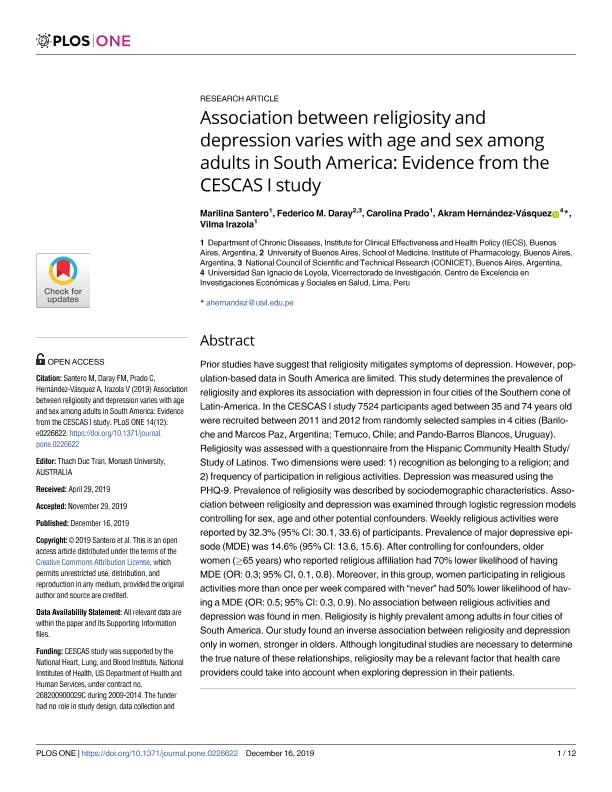Artículo
Association between religiosity and depression varies with age and sex among adults in South America: Evidence from the CESCAS I study
Santero, Marilina; Daray, Federico Manuel ; Prado, Carolina; Hernández Vásquez, Akram; Irazola, Vilma
; Prado, Carolina; Hernández Vásquez, Akram; Irazola, Vilma
 ; Prado, Carolina; Hernández Vásquez, Akram; Irazola, Vilma
; Prado, Carolina; Hernández Vásquez, Akram; Irazola, Vilma
Fecha de publicación:
12/2019
Editorial:
Public Library of Science
Revista:
Plos One
ISSN:
1932-6203
Idioma:
Inglés
Tipo de recurso:
Artículo publicado
Clasificación temática:
Resumen
Prior studies have suggest that religiosity mitigates symptoms of depression. However, population-based data in South America are limited. This study determines the prevalence of religiosity and explores its association with depression in four cities of the Southern cone of Latin-America. In the CESCAS I study 7524 participants aged between 35 and 74 years old were recruited between 2011 and 2012 from randomly selected samples in 4 cities (Bariloche and Marcos Paz, Argentina; Temuco, Chile; and Pando-Barros Blancos, Uruguay). Religiosity was assessed with a questionnaire from the Hispanic Community Health Study/Study of Latinos. Two dimensions were used: 1) recognition as belonging to a religion; and 2) frequency of participation in religious activities. Depression was measured using the PHQ-9. Prevalence of religiosity was described by sociodemographic characteristics. Association between religiosity and depression was examined through logistic regression models controlling for sex, age and other potential confounders. Weekly religious activities were reported by 32.3% (95% CI: 30.1, 33.6) of participants. Prevalence of major depressive episode (MDE) was 14.6% (95% CI: 13.6, 15.6). After controlling for confounders, older women (≥65 years) who reported religious affiliation had 70% lower likelihood of having MDE (OR: 0.3; 95% CI, 0.1, 0.8). Moreover, in this group, women participating in religious activities more than once per week compared with "never" had 50% lower likelihood of having a MDE (OR: 0.5; 95% CI: 0.3, 0.9). No association between religious activities and depression was found in men. Religiosity is highly prevalent among adults in four cities of South America. Our study found an inverse association between religiosity and depression only in women, stronger in olders. Although longitudinal studies are necessary to determine the true nature of these relationships, religiosity may be a relevant factor that health care providers could take into account when exploring depression in their patients.
Palabras clave:
DEPRESSION
,
RELIGION
,
SOUTH AMERICA
Archivos asociados
Licencia
Identificadores
Colecciones
Articulos(OCA HOUSSAY)
Articulos de OFICINA DE COORDINACION ADMINISTRATIVA HOUSSAY
Articulos de OFICINA DE COORDINACION ADMINISTRATIVA HOUSSAY
Citación
Santero, Marilina; Daray, Federico Manuel; Prado, Carolina; Hernández Vásquez, Akram; Irazola, Vilma; Association between religiosity and depression varies with age and sex among adults in South America: Evidence from the CESCAS I study; Public Library of Science; Plos One; 14; 12; 12-2019
Compartir
Altmétricas



